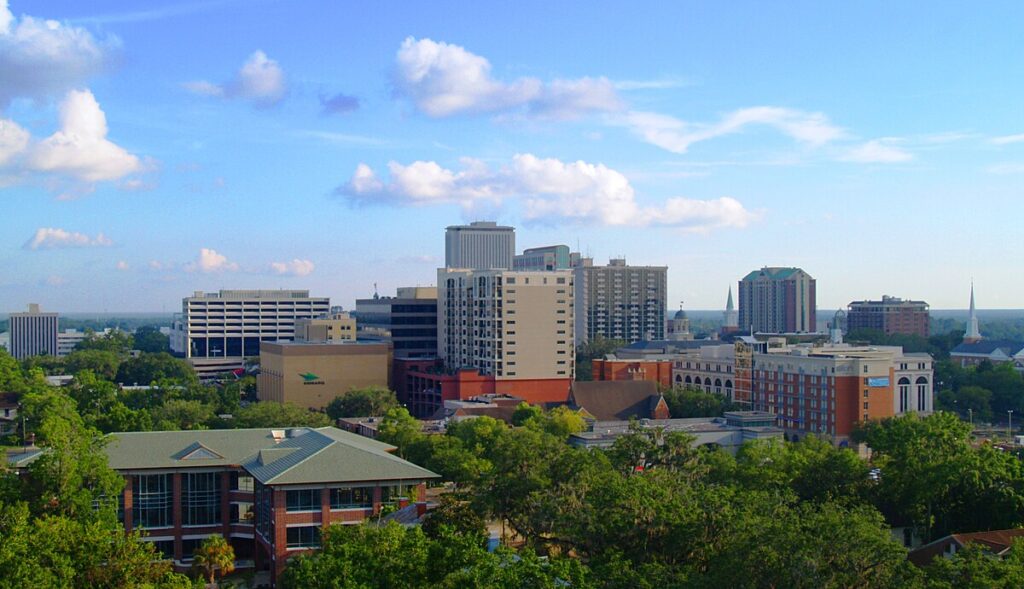
Moving to Tallahassee, Florida: A Comprehensive Relocation Guide
Considering moving to Tallahassee, Florida? This capital city offers government employment, university atmosphere, and rolling hills character. With approximately 200,000 residents in 2025, Tallahassee combines political hub status with college town energy and North Florida’s distinctive Panhandle culture.
Demographic Profile to Consider If Moving to Tallahassee:
Tallahassee’s 2025 population is approximately 200,000 residents in Florida’s capital city. The median age is around 27 years, reflecting large student populations from Florida State University and Florida A&M University. The population is approximately 55% White, 35% Black or African American, 7% Hispanic. Tallahassee features diverse neighborhoods from College Town near FSU to historic districts to suburban developments throughout the rolling hills topography unique for Florida. As state capital and home to two major universities, the city’s identity centers on government and education. Tallahassee attracts government workers, academics, students, and professionals seeking affordable living with cultural amenities. The community balances political activity with college town atmosphere and Southern charm. Find trusted local services for moving, living, and working in Tallahassee.Tallahassee Relocation Directory
Cost of Living to Consider If Moving to Tallahassee:
Tallahassee offers exceptional affordability for a state capital. Median home values range from $240,000 to $320,000 in 2025, significantly lower than most Florida metros. The median household income is approximately $52,000, though this reflects large student population. Rental properties average $1,300 to $1,800 monthly, with student housing affecting the market. Florida’s absence of state income tax benefits residents. Overall cost of living is low compared to most Florida cities, making Tallahassee highly attractive for government workers, young professionals, and those seeking affordable living with cultural amenities. The city provides tremendous value with access to museums, sports, and entertainment. Housing costs create accessibility for diverse income levels.
Economy and Job Market:
Tallahassee’s economy centers on government, education, and healthcare. The State of Florida government employs tens of thousands in legislative, executive, and judicial branches. Florida State University and Florida A&M University provide extensive education and research employment. Major employers include Tallahassee Memorial HealthCare, Capital Regional Medical Center, and state agencies. Professional services including law, lobbying, and consulting thrive serving government. Retail and hospitality support the student population. The stable government and education sectors provide economic foundation. Typical industries include government, education, healthcare, and professional services. The presence of state government and universities creates employment stability.
Education:
Leon County Schools serves Tallahassee students with schools including Leon High School, Lincoln High School, and various elementary and middle schools. The district offers magnet programs and International Baccalaureate options. Florida State University is a major research university and ACC powerhouse offering comprehensive programs. Florida A&M University, a historically Black university, provides excellent programs. Tallahassee Community College offers associate degrees. The concentration of higher education creates an academic atmosphere and provides residents with extensive educational access and cultural programming.
Recreation and Lifestyle:
Tallahassee offers unique recreation with rolling hills, forests, and natural springs uncommon in Florida. Residents enjoy FSU football games creating massive community events, professional sports atmosphere, and tailgating culture. The city maintains extensive parks including Alfred B. Maclay Gardens State Park with historic gardens. Natural springs including Wakulla Springs State Park provide swimming and nature activities. Lake Jackson and Lake Talquin offer fishing and boating. Downtown features the Capitol Complex, museums including the Tallahassee Museum, and dining districts. The Railroad Square Art District showcases galleries and creative businesses. FSU and FAMU sporting events, concerts, and cultural programming provide entertainment. The lifestyle combines college town energy with government activity and Southern culture. The area’s four seasons (mild by Florida standards) enable varied outdoor activities. The community values education, politics, FSU sports, and cultural diversity.
Healthcare and Services:
Tallahassee residents access comprehensive healthcare through Tallahassee Memorial HealthCare and Capital Regional Medical Center providing full-service hospital care. The region’s healthcare infrastructure serves the capital area adequately with quality medical services.
Transportation:
Tallahassee benefits from Interstate 10, U.S. Highway 27, and various corridors. Tallahassee International Airport provides domestic flights. StarMetro operates bus service throughout Tallahassee. The city’s layout and student population support cycling. Most residents use personal vehicles. Campus areas offer walkability. Typical commute times within Tallahassee are reasonable.
Conclusion:
Moving to Tallahassee in 2025 offers affordable capital city living with university atmosphere, government employment, and rolling hills character. The city’s combination of state capital status, FSU Seminoles sports, educational institutions, and Southern charm makes it ideal for government workers, academics, students, and professionals seeking Florida’s most unique metro where politics meets touchdowns and affordability combines with culture in the Panhandle’s distinctive capital.

